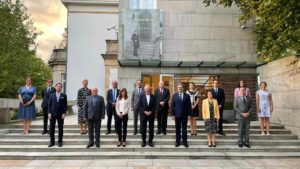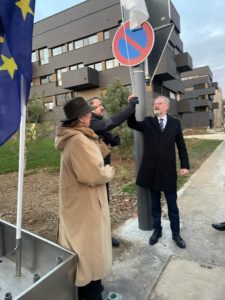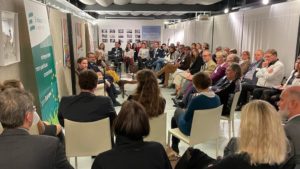Amcham: The second semester of last year in Europe was in Czech colours. In what situation did you take over the presidency and what were the starting points?
Ambassador Bärtl : We had to substantially adjust the Presidency preparations considering Russia’s aggression in Ukraine. Our priorities and programme mainly reflected the current geopolitical situation but also stemmed from the economic challenges framed by the Commission’s work programme for 2022, all while reflecting Czech Republic’s long-term positions and priorities in the EU.
In terms of the EU’s interinstitutional cycle, the Czech Presidency (CZ PRES) took place in the middle of the term of office of the European Commission (EC) and the European Parliament (EP). Most of the main initiatives had therefore already been presented in the form of legislative proposals when the Presidency took over. Therefore, CZ PRES, being the middle state of the current presidential trio (FR CZ SE), had to simultaneously respond to the current state of discussions of legislative proposals in the various Council formations. At the same time, CZ PRES was taking place in the second half of the year, which meant a number of specifics for the Presidency itself, such as taking into account the August and Christmas holidays in the EU institutions. It also had to deal with agendas related to the end of the calendar year, such as questions concerning the upcoming budget, or the imminent start of the next calendar year (e.g. the start of the implementation of the new Common Agricultural Policy). Last but not least, we had to deal with a number of Commissions’ new proposals reflecting the current situation, e.g. in the field of energy that required quick action.
The dynamic programme also reflected on the planning. During the CZ PRES, the calendar was revised several times in order to respond to the geopolitical situation and various resulting crises, with five extraordinary meetings of the Energy Council in July, September (2 extraordinary meetings), November and December, and an extraordinary Justice and Home Affairs Council in November.
At the beginning of your Presidency, you presented five political priorities, all of which concerned Ukraine to some extent. Did the actual course of the CZ PRES correspond to that?
Indeed, the main topic of the CZ PRES was the situation surrounding Russia’s aggression against Ukraine. CZ PRES has actively worked to weaken the Russian aggressor by adopting three sanctions packages and a number of other measures, such as a price ceiling for Russian oil or the suspension of visa facilitation.
On the other hand, CZ PRES also focused on reinforcing the functioning of Ukraine through financial support (EUR 6 billion EUR for 2022 and another EUR 18 billion pledged for 2023) and strengthening the defence capability of its armed forces (EUR 1 million). Let’s not forget that every euro spent in aiding the Ukraine allows for faster EU accession. Furthermore, the adopted FAST-CARE proposal will ensure that the impact on other EU regions is not too harsh, especially on those regions hosting displaced persons from Ukraine, as well as by tackling some of the adverse economic effects of Russia’s aggression.
The Russian aggression, among other things, has raised concerns about the energy situation in the EU Member States; how have you approached this topic within CZ PRES?
Energy was a key topic of CZ PRES, as evidenced by the fact that during the Presidency, the Energy Ministers met eight times and five extraordinary Council meetings were convened, as mentioned earlier. During these meetings, they successfully addressed a mechanism to reduce gas consumption and agreed on solutions to rising energy prices; a Platform for joint purchasing was launched to strengthen solidarity, further reduction in gas consumption; implement measures against high energy prices including a dynamic price cap for natural gas; negotiated a proposal to speed up the permitting process for RES construction; and established a gas market correction mechanism.
However, the proposals of the Fit for 55 package are equally important in the context of weaning ourselves off of dependence on Russian supplies. For this reason, the vast majority of proposals were negotiated by the CZ PRES with the European Parliament (EP), and a preliminary agreement was found also on REPowerEU plan.
One of your political priorities was strengthening Europe’s defence capabilities and cyberspace security; what happened in this area?
The current situation on the international scene has also highlighted the importance of our ability to defend ourselves, both in terms of cybersecurity and conventional security. In response to the increase in cyber-attacks, CZ PRES ensured the strengthening of the security of ICT supply chains and a high common level of cyber-security in EU entities. A coordinated joint response to hybrid threats is ensured through the Council conclusions on foreign manipulation of information and interference and through the implementation guides to the Framework for a Coordinated EU Response to Hybrid Campaigns.
The EU’s defensive capacity within its borders should be enhanced by the coordinated replenishment of the military reserves belonging to Member States that have assisted Ukraine in this respect; through a directive on the exchange of information between police forces, or by a regulation on the electronic exchange of information in cases of terrorism. Concerning the external borders, we have established cooperation in terms of border management between Frontex and our Balkan neighbours.
Another political priority was strategic resilience of the European economy; since Czechia is long-time supporter of free trade, I assume you have focused mainly on that?
Yes, but not only. Topics such as the promotion of the internal market, investment protection, digitalization, and the financial sector were equally important.
Cooperation with third countries, which will now be supported by the Council’s conclusions on sustainability in EU trade agreements, is crucial for the resilience of the European economy. At the same time, the EU will be protected by the regulation on the protection of the Union and its Member States against economic pressure from third countries or the regulation on foreign subsidies.
In the current context, CZ PRES has given equal importance to digitalisation and has thus secured an agreement with the EP on the “Path to the Digital Decade” and the European Declaration on Digital Rights and Principles for the Digital Decade. Furthermore, the regulation establishing harmonized rules for artificial intelligence and the regulation on a European digital identity framework were adopted.
In this context, we cannot overlook the financial sector, whose resilience will now be strengthened through the “Daisy Chain” regulation, the Consumer Credit Directive or the revision of the regulation governing European Long-Term Investment Funds. Trading in crypto-assets will acquire strong and reliable consumer protection rules thanks to the Markets in Crypto-Assets Regulation.
I believe the CZ PRES has not left behind other areas such as cooperation with third countries?
That’s right. We have made progress with west Balkan partners, and under the CZ PRES we formally opened accession negotiations with North Macedonia and Albania, granted candidate status to Bosnia and Herzegovina, and Kosovo’s EU application was handed over to the Czech Presidency.
CZ PRES also succeeded in unblocking talks on expanding the Schengen Area. On 8 December, the Justice and Home Affairs Council approved Croatia’s accession to the Schengen Area with effect from 1 January 2023.
The last political priority of the CZ PRES was the resilience of democratic institutions; how was this achieved during your presidency?
Public participation in political processes is crucial for the resilience of the institutions that are essential to the preservation and development of the values of democracy and the rule of law in the EU. The Conference on the Future of Europe also contributed to this aim, and during the feedback event, the CZ PRES informed citizens about current progress on the resulting proposals.
We can all acknowledge that the Conference on the Future of Europe was an unprecedented exercise in participatory and deliberative democracy at the European level, through the direct involvement of citizens in the form of panels. The CZ PRES supported the European Commission’s President Ursula von der Leyen in her State of the Union speech on 14 September, where she announced that “the Citizens’ Panels that were central to the Conference will now become a regular feature of EU’s democratic life.” The first European Citizens Panel on food waste has already been convened during the CZ PRES.
In this context, the conclusions on the Youth Action Plan on youth involvement in EU external action are directed at our younger citizens. A general approach to transparency and targeting of political advertising was achieved, making it easier for citizens to distinguish paid political content.
Furthermore, violations of restrictive measures have been included in the list of “EU crimes”. It is essential that the sanctions adopted in the context of Russia’s offensive war are fully implemented.
Can you provide some figures to characterize the past semester in the colours of CZ PRES?
Within the framework of CZ PRES, almost 50 sectoral Councils of the EU met in Brussels and here in Luxembourg; ambassadors gathered 94 times (in COREPER I, COREPER II and COPS), working parties 1 421 times. What is really important is, that 98 trilogues were held with the EP with 33 of them being successfully concluded. Altogether 315 events were held in Czechia during the Presidency, of which 274 took place in Prague and the rest in the regions. A total of 14 informal Ministerial Councils were organized in Prague, and in October the very first summit of the European Political Community was held at Prague Castle, attended by leaders from 43 countries, followed by an informal European Council, which resulted in an agreement of the leaders on a new Secretary- General of the Council.
In addition, six meetings of the Association and Cooperation Councils with third countries were held, with the EU-Israel Association Council meeting taking place ten years after the last meeting.
In total, Czechia conducted approximately 1700 formal meetings at ministerial (EU Council), ambassadorial (Coreper/COPS) and technical level (working groups).
During CZ PRES, over 35,000 accreditations were issued for almost 300 events and almost 50,000 badges were printed, including accreditations for delegates, journalists, suppliers, host broadcasters, public participants and event organisers. Not to be forgotten are the so-called floaters, which were used to divide security perimeters inside conference areas during political summits.
Throughout the entire CZ PRES, the dedicated fleet of vehicles, which was driven by members of the Czech Police and the Czech Army, covered a total of 216,000 km (including test drives before the start of CZ PRES), which is the equivalent of circling the globe five times. 68,000 km were covered in live operation, transporting a total of 795 delegations and accompanied by operational vehicles in police colours. (In case of raising questions concerning our carbon footprint, we would like to remind that the vast majority of these cars were electric Škoda Enyaqs, then some hybrid VWs with only a few petrol-powered cars).
In the preparatory phase, the Czech Police identified 5 highly security-sensitive events for which armoured vehicles were rented. These events were the informal meeting of the Justice and Home Affairs Council (JHA), the Foreign Affairs Council (in the format of Defence Ministers/, FAC Defence), the informal meeting of Foreign Ministers (Gymnich), the Economic and Financial Affairs Council (ECOFIN) and finally the Prague Summit in conjunction with the European Political Community.
I assume this session was the most challenging in terms of security?
That’s right. To illustrate the scale of security, at the time of the event there were nearly 50 vehicle convoys with protected persons, each consisting of 5-6 vehicles, moving around Prague. Specifically, on 6 October, 49 protected persons (44 countries + guests, 11 presidents) were protected.
Many delegations travelled to the event from their accommodation, which included 15 different hotels. All of them had to be secured and permanently guarded by the Czech Police during the summit. The remaining Heads of State arrived at Prague Castle directly from Václav Havel Airport Prague (on 6 October in the morning, a total of 25 special planes landed at Terminal 4).
While on the subject, the Prague Summit enjoyed huge media popularity and a very successful media coverage. Footage from the Prague Summit was broadcasted by 112 channels of 50 different TV stations from all over the world with a total of 3345 views. Online, the footage was shared by 15 TV channels in 107 posts and generated over 2 million views in total, with the highest numbers in Germany (1,156,271 views), Armenia (434,671 views) and France (321,150 views).
In terms of individual coverage of the Prague Summit, the European Political Community (37 channels, 22 different TV channels, 190 live views) had the largest reach. Overall, the summit had the largest reach in Germany, followed by Switzerland, France and Hungary. Beyond the EU, shots also reached Qatari media, Russia, Asian countries, Australia and Saudi Arabia.
What was the interest from journalists in general during CZ PRES?
In the period from mid-June to the end of October, i.e. during the period when the top events took place in Czechia, we received a total of 3,728 applications for journalist accreditation; more than half of them eventually participated.
The most successful event in terms of accreditation applications and participation of journalists was of course the Prague Summit. Out of a total of 1,204 accredited journalists, 1,138 arrived. In this case, almost 95% participation was recorded compared to the number of accredited journalists.
The imperative of these days is communication, especially through social networks. How did you deal with this during CZ PRES?
CZ PRES communication operated on three social platforms – Twitter, Facebook and Instagram. The official Twitter account of the CZ PRES was extremely successful in terms of traffic and reactions and was used as one of the main communication channels to the foreign and professional public and the so-called Brussels bubble.
The Instagram account of CZ PRES was used primarily for communication with the general foreign public – publishing mainly soft content with less informational and political context.
The Facebook page was used primarily for communication with the Czech public. Both informational posts and soft content were posted there.
We are talking about a semester in Czech colours; the CZ PRES logo was indeed very colourful. What was its motif?
The basic element of the logo is a triangle referring to the wedge on the Czech flag, which is the only one in the EU with this shape. It is a distinctive and unique element. The logo contains a total of 27 elements representing the Member States of the European Union with each element based on the colours of their national flag. Together representing the shape of a compass needle, the circular arrangement of the elements mirrors the position of the stars on the flag of the European Union.
The homogeneous emblem composed of several elements reflects the motto of the European Union “United in diversity”.
Of course, we are also interested in how CZ PRES has performed here in Luxembourg?
EU Councils are periodically held in Luxembourg, regardless of which country is currently in charge; with coordination from Prague and the Permanent Representation of CZ in Brussels, the CZ Embassy in Luxembourg proudly provided additional assistance.
Our focus of the bilateral embassy team was on presenting CZ PRES priorities to partners, the media, and public. In close cooperation with Anne Calteux, head of the European Commission Representation in Luxembourg, we coordinated the Heads of Missions meetings with Luxembourg representatives. As such, we had the opportunity to learn about current national interests regarding EU priorities from the perspective of Prime Minister X. Bettel, Minister of Foreign Affairs J. Asselborn, Minister of Economy & for Development Cooperation and Humanitarian Affairs F. Fayot, Minister of Finance Y. Backes and Minister of Energy C. Turmes.
For capacity reasons, only resident ambassadors of EU Member States attended these meetings. Therefore, I decided to host one informal Heads of Missions meeting to which I also invited non-resident ambassadors, colleagues of candidate countries including several non-European ambassadors, President of the Chamber of Deputies F. Etgen, and political director of the MFA V. Dockendorf. Having wanted to choose an informal setting and participate in typical Luxembourg activities, the company Bernard-Massard and I agreed on grape harvesting in a vineyard in Mosel.
Together with the Europa-Union Luxemburg and The European Movement of Luxembourg (MEL), we organized a pilot debate evening on the Presidency and contemporary global challenges. The panel, moderated by M. Reicherts and H. Reichert, featured R. Goebbels, J-L. Thill, Dr. T. Novotná and myself.
The main accompanying event of CZ PRES in Luxembourg was a strong presence at the CinÉast film festival thanks to Czechia being the country of focus.
Another highlight of the CZ PRES in Luxembourg was the opening of Václav Havel Street in Kirchberg, along with a new sculpture by Jiří David depicting Havel’s quote “Love and truth must prevail over lies and hatred.” This event was attended by Prime Ministers of both countries and fittingly represented the CZ PRES with its main slogan being Havel’s expression “Europe as a task”.
It is perhaps worth noting that in 2022 we also celebrated 100 years of diplomatic relations with Luxembourg and a number of other events (commemorating the anniversary of P. Werner, etc.) were intertwined with the CZ PRES programme.
Is there anything you would like to say in conclusion?
Yes. I would like to thank my Luxembourg partners and colleagues in the diplomatic corps for their support during this challenging period. My thanks also go to my colleagues at Brussels and Prague for seamless communication and, of course, my embassy here in Luxembourg; we are a small team and I must say they have been excellent throughout the year.
After all, the Czech Embassy building, with its European heritage thanks to Pierre Werner, will not be parting with PRES for long. We have agreed with our Swedish colleague A. M. Hellgren, who is not ambassador in residence, to make the premises available for meetings between heads of missions and Luxembourg officials.
Good luck SE PRES!
Lycka till, Sverige!
|
|

Informal Heads of Missions on grape harvesting. President of the Chamber of Deputies F. Etgen and Chargé d’Affaires of Ukraine N. Anoshyna |
|
|
|

|


